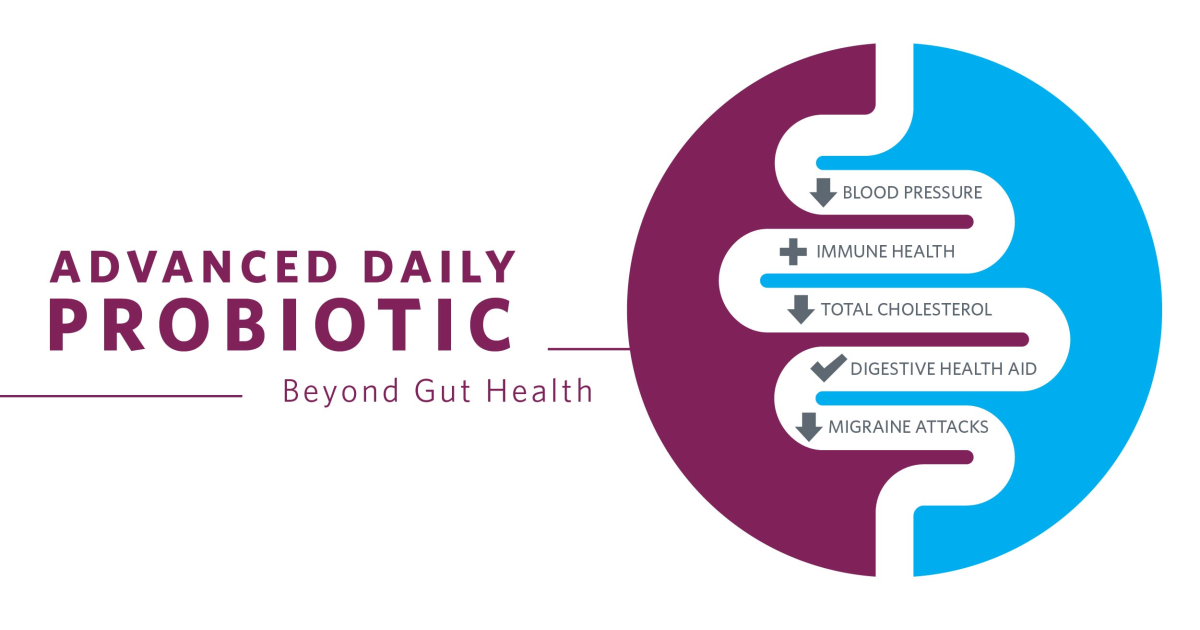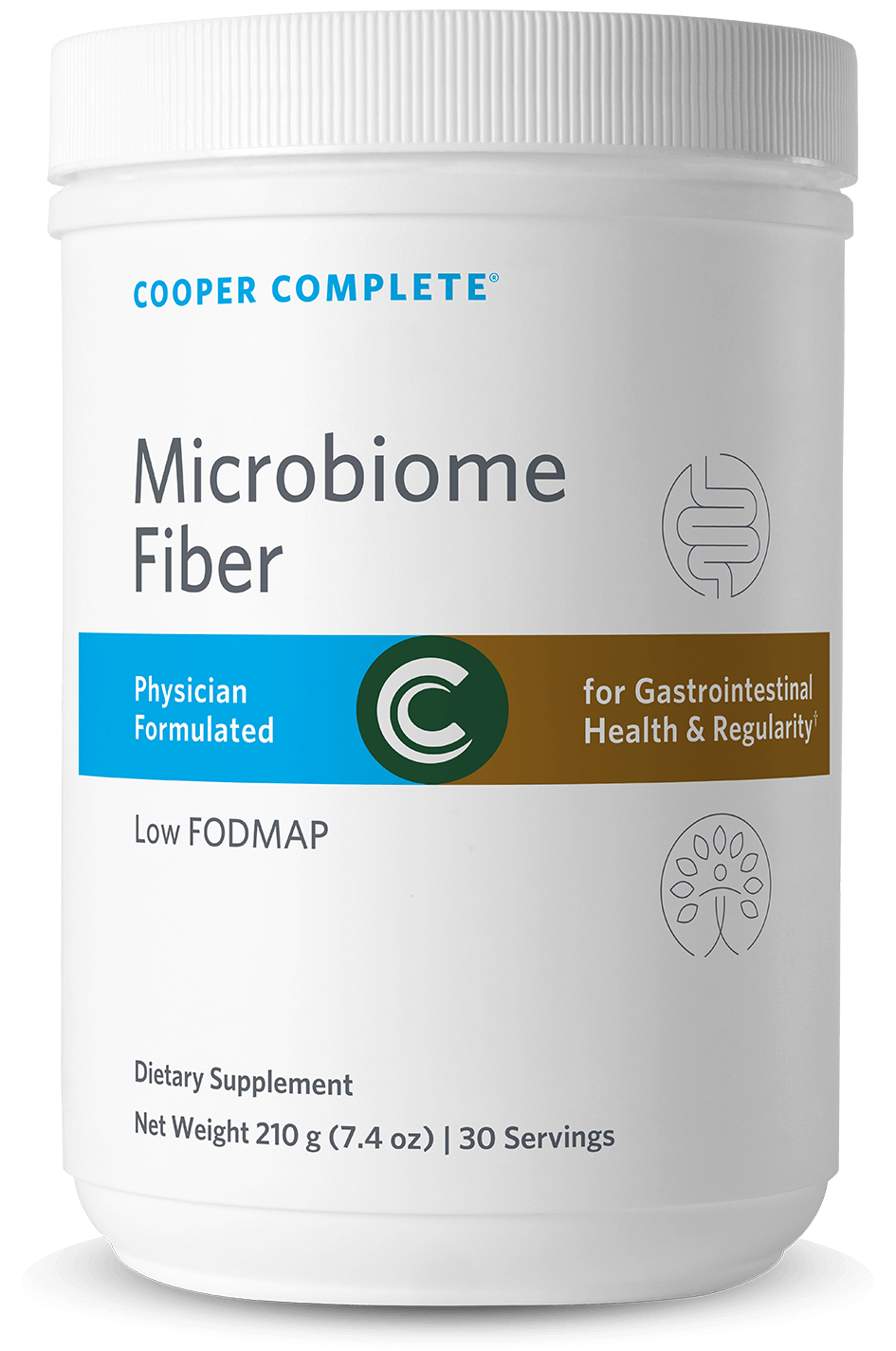Health Benefits of Probiotics

Currently, about one in three U.S. adults regularly takes a probiotic. Among adults, probiotics or prebiotics are the third most commonly used dietary supplement, besides vitamins and minerals. Probiotics are beneficial bacteria that support digestive and immune health†. Prebiotics, found in fiber, provide fuel for the probiotics to support the gut and aid in digestion†. Probiotics are found everywhere—from supplements to refrigerated yogurts and even beverage aisles. You can even find probiotics (and prebiotics) added to soft drinks. Does all this leave you wondering about the health benefits of probiotics and whether you should take them? In this blog article, we dig into the benefits of probiotics.
Probiotics are live microorganisms. Although we often think of “bacteria” as harmful, many microorganisms are helpful. Some of these bacteria help digest food and destroy disease-causing cells. You already have some in your body and can find them in yogurt, kefir, and other fermented foods, such as sauerkraut, kimchi, and kombucha tea, as well as in dietary supplements.
Past research has examined the role of probiotics in gut health, with generally unremarkable results. Now, researchers are looking at the benefits of probiotics on other health conditions. So, what are the health benefits of probiotics?

Advanced Daily Probiotic Supplement
Advanced Daily Probiotic supplement contains a proprietary blend of 4 strains and 35 billion CFU probiotics to support gut microflora and immune health.†
$46.98 Add to cart1. Immune System Support†
Many daily activities impact our immune system. Washing our hands frequently, eating a diet rich in fruits and vegetables, and getting adequate sleep are just a few. But is there a way to improve our immunity beyond our lifestyle choices? It appears probiotics may be a good choice†. A meta-analysis of 18 randomized clinical trials on Lactobacillus plantarum and immune health suggests that L. plantarum enhances the immune response by modulating both pro-inflammatory and anti-inflammatory cytokines†. Cytokines are small proteins released by the cells that are critical in controlling the growth and activity of other immune system cells and blood cells. (Learn more: Kenneth H. Cooper, MD, MPH, shares immune health tips.)
2. Supports Healthy Blood Pressure Levels†
The Centers for Disease Control and Prevention (CDC) states that almost half of all U.S. adults have high blood pressure, with only 24 percent having their hypertension under control. High blood pressure is defined as blood pressure at or above 130/80 mm/Hg. High blood pressure is associated with a greater risk of heart disease, stroke or heart attack.
Promising research shows that probiotics may help lower blood pressure†. Nine clinical trials, reported in the American Heart Association’s Hypertension Journal, found a significant reduction in systolic (3.56 mm Hg) and diastolic (2.38 mm Hg) blood pressure compared to placebo†. Read about more ways to control high blood pressure here†.
3. Seasonal Allergies and Nasal Health†
Often called hay fever, an increasing percentage of us now experience allergic rhinitis. The all-too-familiar symptoms of sneezing, congestion, an itchy nose, and a sore throat occur when we breathe in something we are allergic to, such as dust or pollen. A review of 23 studies suggests that probiotics may help alleviate symptoms and improve quality of life†. Uncover more seasonal allergy supplements and solutions here†.
4. Support for Head Discomfort and Occasional Headaches†
If you are one of the 13 percent of Americans who suffer from migraines, you have likely heard of the gut-brain axis. The term refers to the bidirectional relationship between the GI and central nervous systems. There is a higher incidence of headaches in patients with gastrointestinal disorders, suggesting a link between gut microbiota and brain function†. By altering the types of bacteria in your gut, it may be possible to improve your brain health†. A 2019 study found evidence that the benefits of probiotics include reducing the frequency, severity, and duration of migraine attacks†.

Microbiome Fiber Supplement
Cooper Complete® Daily Prebiotic Microbiome Fiber supplement contains 6 grams of tasteless and gritless soluble fiber and is low FODMAP to support gastrointestinal health and regularity.†
$30.48 Add to cart5. Supports Healthy Cholesterol Levels†
High cholesterol is another condition that puts you at risk for heart disease and stroke. Approximately 94 million American adults have high cholesterol (total blood cholesterol ≥ 200 mg/dL). You can reduce your cholesterol level through lifestyle changes, such as eating a heart-healthy diet and increasing physical activity. There is evidence that certain probiotics, particularly Lactobacilli, can prevent cholesterol from being made and absorbed, as well as help break it down†. A meta-analysis showed that lactobacillus probiotics can reduce total cholesterol by about 10 mg/dL and LDL by about 9 mg/dL in patients with or without hypercholesterolemia†. (Cooper Clinic Cardiologist Nina Radford, MD, FACC, explores whether the supplement berberine can help lower LDL cholesterol.)
6. Respiratory and Sinus Health†
Viral respiratory tract infections are a frequent cause of infectious illnesses, such as the common cold. A review published in 2020 in the journal Nutrients examined research on probiotics related to respiratory illness. The conclusion was that probiotic use is associated with fewer and shorter durations of mild respiratory tract infections†.
7. Periodontal Disease – Gum and Oral Health
The gut is not the only place where bacteria live. More than 700 species of microbes live in our mouths, including bacteria. Just like the gut, it is important to maintain the right balance for good dental health. If it gets out of balance, the harmful bacteria can lead to gum disease. Scientists are discovering that probiotics can help alleviate this imbalance and may also aid in combating gum disease†. A 2016 review of 12 randomized clinical trials (RCTs) found that, in general, taking probiotics generally improved the clinical signs of periodontitis†. Of course, maintaining good oral hygiene by thoroughly brushing and flossing is the foundational key to good oral health.
Top Food Sources of Probiotics
Probiotics naturally occur in fermented foods. By incorporating these foods into your diet, you can naturally support gut health with a variety of beneficial probiotic strains:
-
Yogurt – A common probiotic-rich food, but not all yogurts contain live cultures. Some are heat-treated after fermentation, which destroys beneficial bacteria. To ensure you’re getting probiotics, look for labels that state “live and active cultures” and check for specific strains like Lactobacillus and Bifidobacterium. Avoid yogurts with excessive added sugars, as they can counteract the gut health benefits.
-
Kefir – A fermented milk drink with multiple probiotic strains and a higher concentration of beneficial bacteria than most yogurts. Some store-bought kefir products may be pasteurized after fermentation, which kills the beneficial bacteria. Therefore, look for labels stating “live and active cultures” to ensure probiotics are present. (Some pasteurized kefir has probiotics added to the drink after the heat treatment.)
-
Sauerkraut–Fermented cabbage rich in probiotics, but choose unpasteurized versions, as pasteurization kills live bacteria. Unpasteurized sauerkraut is typically found in plastic pouches or glass jars and stored in the refrigerated section of grocery stores. Canned sauerkraut is almost always pasteurized, as the high heat used in the canning process kills beneficial probiotics. Check the label for terms like “raw,” “unpasteurized,” or “contains live cultures.” Avoid products that list vinegar as an ingredient, as traditional fermentation relies on salt and natural bacterial cultures, not vinegar.
-
Kimchi – A spicy Korean fermented vegetable dish packed with probiotics and beneficial nutrients. To ensure the kimchi contains probiotics, choose refrigerated kimchi over shelf-stable varieties.
-
Miso & Tempeh – Fermented soy-based foods provide probiotics and essential nutrients like protein and fiber. To ensure they contain probiotics, opt for unpasteurized miso, as pasteurization destroys beneficial bacteria. Look for traditionally fermented tempeh that has not been pasteurized. However, heat can kill probiotics in both miso and tempeh, so it is best to avoid boiling, baking, frying, or grilling. Lightly steaming will not impact the probiotic benefit.
-
Kombucha – A fermented tea containing live probiotics and organic acids that support digestion. When selecting kombucha, look for labels with terms such as “raw,” “unpasteurized,” or “contains live cultures.” Avoid brands that pasteurize their kombucha, as this process kills the probiotics. Be aware of added sugars, as some kombuchas contain excessive amounts.
-
Pickles (Fermented in Brine) – Look for naturally fermented pickles in the refrigerated section rather than those preserved in vinegar, which lack probiotics. To ensure they contain live cultures, choose pickles labeled “fermented,” “contains live cultures,” or “naturally fermented.” Look for pickles fermented in a saltwater brine rather than those made with vinegar, as vinegar does not support probiotic growth.
FAQ: Probiotic Supplements
When is the best time to take a probiotic?
The best time to take a probiotic depends on the specific strain; however, taking probiotics first thing in the morning or right before a meal that contains some fat may improve survival in the digestive tract.
Does taking a probiotic for constipation work?
Probiotics may help support regular bowel movements by improving gut motility and promoting a balanced microbiome†.
Are there side effects when starting probiotics?
Some people experience mild digestive symptoms, such as bloating or gas, when first taking probiotics. These effects usually subside as the body adjusts.
How should a probiotic be stored?
Storage depends on the type of probiotic. Some require refrigeration to maintain potency, while others are shelf-stable. Always check the label for storage instructions to ensure viability. Each Cooper Complete Advanced Daily Probiotic capsule is stored in a nitrogen-purged blister pack to protect it from heat, moisture, and oxygen. The packaging protects the probiotic, so for its viability, it’s important not to open it until ready to take it.
Do probiotics need to be taken daily?
For best results, probiotics should be taken consistently. While some people may notice benefits within days†, probiotics are optimally taken daily.
Can probiotics help with bloating?
Certain probiotic strains, such as Lactobacillus acidophilus (found in Advanced Daily Probiotic), have been studied for their potential to support digestive comfort and reduce bloating†. However, some people may experience temporary gas or bloating when they first introduce probiotics.
Can you take too many probiotics?
While probiotics are generally safe, taking excessively high doses may cause mild digestive discomfort, such as bloating or loose stools.
Probiotics are a promising area of 21st-century medicine, with emerging research suggesting potential benefits supporting gut health, immune function, and overall well-being†. Whether through probiotic-rich foods or supplements, maintaining a balanced microbiome may support both preventive and therapeutic health. However, individual responses can vary, so it’s important to consult your physician or health care practitioner before adding a supplement, including probiotics, to ensure it aligns with your personal health needs and goals.
About the Author: Cathy Sides is the Director of Customer Relations for Cooper Complete® nutritional supplements. Since joining Cooper Aerobics in 2007, she has helped customers make informed decisions about supplements. Cathy also contributes blog content focused on vitamins, supplements, and healthy living.
